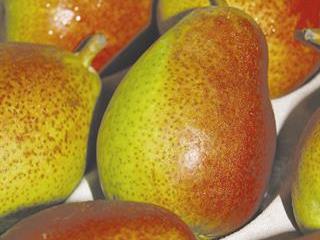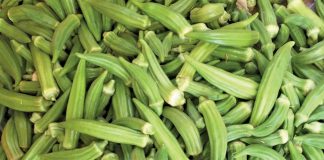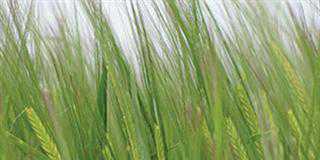
Blushed pears are A uniquely South African pear, as the first blushed varieties were bred and grown here. Breeders and growers continue to break new ground in this field, and one of the most recent achievements is the release of the new variety Cheeky.
Filling the gap
This is the first significant new pear variety since the release of Flamingo and Rosemarie early in the 1990s. Confidence in the latter eventually faded away, mainly because of production problems.
Forelle, at that stage establishing itself as the late blushed variety, has since grown into what’s probably South Africa’s best performing pear. But the industry still needed a more diverse range of blushed pears for the South African (local and export) marketing season.
“The Cheeky pear was bred to fill a specific time gap in the market – a blushed pear for early ripening,” explains Christo Strydom, a technical expert with Wolseley Fruit Packers Co-Operative (Wolfpack). “As South Africa is the market leader in blushed pears, it would be to the industry’s advantage to have blushed pears available throughout the season.”
Taaibos Human, project leader for pear and pome fruit-breeding evaluation at the Agricultural Research Council’s (ARC) Bien Donne Experimental Farm, and a well-known breeder in the South African deciduous fruit industry, is the man behind Cheeky.
Stepping into the role of project leader of the pear-breeding programme at Bien Donne, he initiated the pear cross that led to the release of this cultivar in May 2009.
“The breeding programme took 16 years, but the Cheeky pear is now ready to be commercialised, and more than 200 000 Cheeky trees have already been ordered,” says Taaibos.
It will be commercialised by Culdevco, the South African cultivar development company with which the ARC has an agreement for the commercialisation of its varieties. Taaibos is confident that South Africa will see its first commercial harvest of Cheeky pears in five years time.
First impressions
“Cheeky is a new generation blushed pear – it has a more intense and consistent blush than the other varieties,” Taaibos explains.
“The flesh is juicy with a strong pear flavour and it doesn’t require the storage period before marketing that Forelle does.” The blush on pears is normally enhanced by cool nights during the last months leading up to the harvest. In South Africa, this becomes difficult because these months are usually the hottest of summer. Taaibos says Cheeky is relatively heat-resistant and is less likely to lose colour, even in warmer conditions.
“The breeding programme looks at aspects such as colour, fruit size and storage life, but it’s essentially up to the farmers who do test plantings to report on whether or not the cultivar is suitable for commercial purposes, Taaibos says. “This assessment is made by observing how well the tree performs in an orchard.”
Cultivating Cheeky orchards
Six years ago Wolseley farmer Anthony Dicey, together with Wolfpack, established one of the three semi-commercial test plantings of Cheeky on his farm La Plaisante.
He immediately noticed the cultivar’s vigorous growth, and realised that special attention should be paid when selecting rootstock and soil. Taaibos says there have been some problems matching Cheeky with the right rootstock and it’s possibile the variety could be incompatible when budded directly with quince rootstock.
“I’d suggest using a dwarfing rootstock and planting in somewhat marginal soils, but the combination has to be chosen carefully,” says Anthony.
Wolfpack’s technical expert, Christo Strydom, who worked with Anthony to establish the semi-commercial test planting in Wolseley, says they picked up several challenges in cultivating Cheeky.
“Because of the variety’s vigorous growth, it tends to be less fertile than other cultivars, and a farmer will have to employ certain production practices to get it to flower adequately,” says Christo. He and Anthony agree that ring-barking the trees worked very well and they suggest a tree should not be over-pruned.
They have also observed that flower buds tended to develop more frequently at the end of shorter shoots. “Getting the tree to bud and flower could be a challenge, especially for farmers in warmer areas, but fortunately, once you get the tree to flower, fruit setting happens quite easily. We have found that just about all the flowers set,” says Anthony.
“The trees in this test block were planted six years ago and they are very sensitive to bacterial blister bark, but if the tree is healthy, this only affects the surface of the bark and doesn’t have a negative effect on the productivity of the tree,” Christo adds.
Productivity
Christo and Anthony say the trees started to produce some fruit in their fourth year and they take about six years to come into full production. “I’m very excited about Cheeky and it will definitely help to further diversify the range of pears produced in South Africa,” says Anthony.
“It doesn’t happen often that we get a new pear variety such as this one. It has the potential to perform well, while the fruit has all the attributes that will make it attractive to consumers and therefore easy to market.”
For Anthony and Christo, one of the greatest advantages of the Cheeky pear is that it blushes quite easily and retains its blush colour better than some other blushed-pear varieties do. Christo also notes its good size, giving it an advantage over smaller varieties in an overstocked market.
And the future?
“Wolfpack has done spot checks in the European market and so far the feedback has been very positive in terms of colour, taste and fruit size,” says Christo. And Cheeky won’t have to fight for its own place on supermarkets shelves. “When blushed pears first appeared, the market had to be conditioned to the fact that they were a unique line.
Getting supermarkets to recognise their distinctiveness was a huge achievement,” Taaibos recalls. Anthony says, “It will probably be one of the more difficult pear trees to farm with, but if you can get bud initiation right, this cultivar will have a potential high income and you will ultimately grow a very marketable product.”
Contact Anthony Dicey at [email protected], Christo Strydom at [email protected] or Taaibos Human at [email protected] or 083 749 4487.













